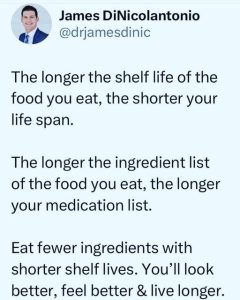
This is a pretty good example of someone taking an incomplete look at a subject and making a simple conclusion that has some truth in it but is sometimes completely wrong so as to cause confusion. I feel for people trying to get educated on how to live the healthiest life when confronted with partial truths and contrary or completely incorrect data.
Now I have given you my opinion (and label it as such) what is the data behind me forming that opinion?
30 years ago Dr Graeme Romans told me, “Get as wide a range of foods into you as possible.” So instantly Dr James hits up against a datum I had been given and taken aboard.
So, when confronted with two datums in conflict, how do you resolve it rather than rejecting the latter outright? You look for more data that supports either to determine which is correct and you look at the purpose the person had in offering you the data.
16 years ago when I first started making an energy bar for my daughter, I researched the health benefits of each of the ingredients I used. I then broadened my learning and looked at the health benefits of each type of nut and was surprised to learn each nut had a different health benefit to the body. Each dried fruit had a different health benefit. And the more I read, the more I was amazed at the powers inherent in different plants.
The top level of classification of nutrients is fat, protein, carbohydrates and water.
The next level is Vitamins (about 16) and Minerals (over 70).
The third layer is phytonutrients or phytochemicals. There are, I have read, about 40,000 of them of which we have identified and know something about 10,000 of them. So there is far more we don’t know than there is that we do know!
Hence why having a broad range of foods in your diet leads to a wider range of nutrient intake and a potentially better health outcome.
So what point is Dr James making and why? He is, I presume, talking about highly processed foods formulated by a food chemist with the intention of finding the “bliss point” where the food tastes so good it is (almost) addictive and will last a long time on the shelf without going bad.
These purposes are great for a food manufacturer but not so great for a consumer. You may have seen a previous meme, “The longer the shelf life, the shorter yours!” referring the the harm done to the body by preservatives.
But Dr James’ simple statement erroneously miscategorises products like my NutriBlast Greens+ that has 205 ingredients and my Bug Out Bar with 235. Not a preservative or artificial colour or excitotoxin amongst them!
